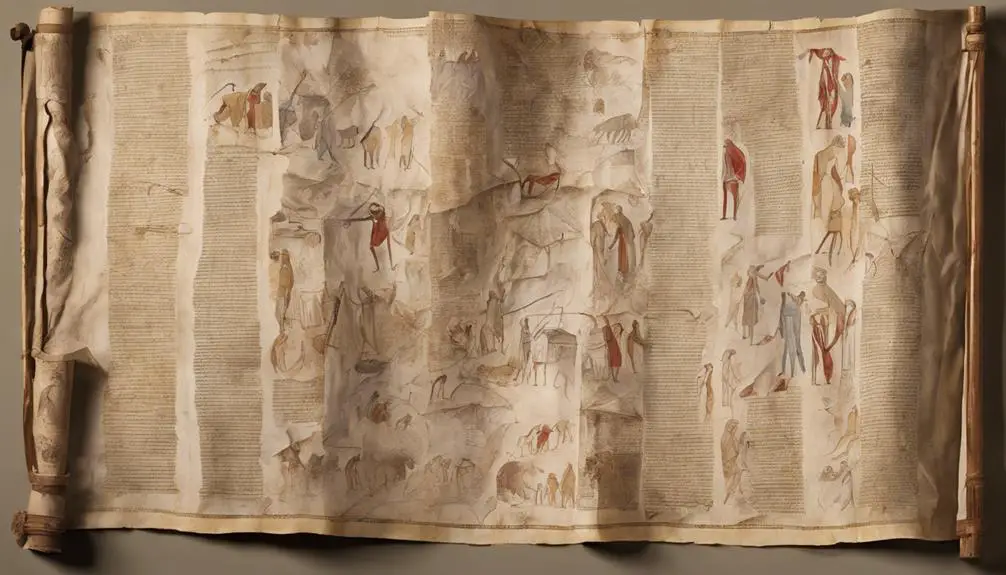Navigate the profound implications of 'If Then' statements in the Bible and discover how they shape divine understanding and moral obligations.

If Then Statements in the Bible
The Bible, that sacred tome of antiquity, is brimming with what you'd call 'If Then' statements. You've likely encountered these – passages where God lays out a condition ('if you do this') followed by an outcome ('then this will happen'). But have you ever stopped to ponder their deeper implications?
How do these statements shape our understanding of God's character, our relationship with Him, and our moral obligations? There's a rich vein of wisdom to be mined here, one that might fundamentally reshape your approach to life's big questions.
Are you ready to embark on this journey of discovery?
Key Takeaways
- 'If Then' statements in the Bible are crucial for understanding conditional faith and deciphering scriptural promises.
- These statements illustrate cause-and-effect relationships, emphasizing human agency in fulfilling divine promises.
- Theologically, 'If Then' statements reflect God's justice, fairness, and covenantal nature, requiring careful contextual analysis.
- 'If Then' statements guide practical morality and spiritual accountability, encouraging individuals to live out Christian beliefs with trust and grace.
Understanding 'If Then' Statements

Diving into the heart of biblical literature, you'll find that understanding 'If Then' statements is crucial in deciphering the conditional promises and consequences outlined in the scriptures. These statements reflect a fundamental concept of Biblical Logic, embodying the essence of Conditional Faith.
In essence, 'If Then' statements form a conditional sentence structure that hinges on two clauses: an 'if' clause, which states a condition, and a 'then' clause, which describes the outcome if the condition is met. This style of logical reasoning isn't unique to biblical literature; it's a staple of rational thought and argumentation used across various disciplines.
But in the context of the Bible, 'If Then' statements take on a deeper significance. They represent the cause-and-effect relationships that God has established with His people. The 'if' clause encapsulates a command or expectation from God, and the 'then' clause outlines the blessings or consequences that will follow based on obedience or disobedience. Therefore, understanding these 'If Then' statements isn't just an exercise in biblical interpretation, but a pathway to grasping the pivotal role of Conditional Faith in the believer's relationship with God.
Biblical Examples of 'If Then' Statements

Now, let's explore some specific examples of 'If Then' statements in the Bible to better illustrate their impact and significance in the text. These instances often involve conditional promises and carry Biblical consequences.
Consider the example in Deuteronomy 28:1-2: 'And it shall come to pass, if thou shalt hearken diligently unto the voice of the LORD thy God, to observe and to do all his commandments which I command thee this day, that the LORD thy God will set thee on high above all nations of the earth: And all these blessings shall come on thee, and overtake thee, if thou shalt hearken unto the voice of the LORD thy God.' Here, the 'If Then' structure outlines the conditions for receiving God's blessings.
Another instance is Proverbs 3:5-6: 'Trust in the Lord with all thine heart; and lean not unto thine own understanding. In all thy ways acknowledge him, and he'll direct thy paths.' The 'If Then' statement here implicitly promises that if you trust in the Lord and acknowledge him, then he'll guide your paths.
These examples highlight how 'If Then' statements function in the Bible to establish conditional promises and potential consequences.
Theological Significance of 'If Then' Statements

Understanding the theological significance of 'If Then' statements in the Bible offers a deeper insight into the nature of God's promises and the conditions under which they're fulfilled. These statements, often termed as Conditional Promises, aren't just philosophical or moral guidelines, but bear profound Covenantal Implications.
In essence, the 'If Then' structure highlights the reciprocal relationship between God and humanity. It's not just about God making promises; it's also about the conditions attached. For instance, God often promises blessings 'if' people obey His commandments, implying that these blessings aren't arbitrary, but rather contingent on human obedience.
These statements underscore the covenantal nature of God's interactions with humanity. They serve as contractual agreements, where responsibilities are assigned, and consequences determined based on adherence or deviation. This not only reflects the justice and fairness of God but also emphasizes human agency in the fulfillment of divine promises.
Hence, the 'If Then' statements aren't mere literary devices. They're theological constructs that provide a nuanced understanding of how God's promises operate and the inherent covenantal implications. Understanding this can significantly enhance your biblical scholarship and your personal walk with God.
Interpreting 'If Then' Statements in Bible Study

In your journey through Bible study, you'll find that interpreting 'If Then' statements requires careful analysis and a comprehensive understanding of the context. These statements often represent conditional theology, an essential aspect of Biblical interpretation. This theology hinges on the premise that God's promises are contingent upon human response.
When you encounter 'If Then' statements, it's crucial to understand the condition and its corresponding promise. For instance, in John 15:7, 'If you remain in me and my words remain in you, then ask whatever you wish, and it will be done for you.' The 'If' part of the statement sets the condition of remaining in Christ, and the 'Then' part outlines the promise of answered prayer.
It's important to recognize that these aren't mere formulas, but rather expressions of deep relational truths. Biblical promises aren't detached from our conduct or faithfulness. They're intertwined with our obedience and trust in God. So, when interpreting 'If Then' statements, remember that it's not just about intellectual understanding, but also about nurturing a responsive, faith-filled relationship with God.
Application of 'If Then' Statements in Daily Life

Applying 'If Then' statements from the Bible to your daily life can significantly shape your decisions, actions, and overall perspective on faith and obedience. These statements encapsulate the essence of Practical Morality and Spiritual Accountability, challenging you to live out your Christian beliefs in a tangible and meaningful way.
Consider the following table that pairs some common 'If Then' statements with their potential real-life applications:
'If Then' Statement |
Real-Life Application |
|---|---|
If you believe, then you will be saved. |
Emphasizing the importance of faith, this statement can guide you to trust in God's promises and live a life of obedience. |
If you forgive others, then you will be forgiven. |
This emphasizes the need for forgiveness in your daily interpersonal relationships, reflecting the grace you've received from God. |
If you seek, then you will find. |
This encourages a continuous pursuit of spiritual growth and knowledge, not to be complacent in your faith journey. |
If you love, then you will be known as Christ's disciple. |
This urges you to demonstrate love in every interaction, mirroring Christ's love to the world. |
Frequently Asked Questions
What Is the Historical Origin of 'If Then' Statements in the Bible?
You're inquiring about the historical origins of certain conditional structures found in biblical interpretations. This is rooted in the principles of contextual understanding. It's not so much about 'if then' statements but rather how language and logic were used by biblical authors to convey divine messages.
In-depth study of the original languages (Hebrew, Aramaic, Greek) reveals the use of these logical constructs to shape moral, spiritual, and societal norms.
Are 'If Then' Statements Found in Other Religious Texts Apart From the Bible?
Yes, you'll find 'if then' statements in other religious texts besides the Bible. In comparative theology, these conditional clauses are a common tool for expressing spiritual principles.
For instance, in the Quran, Quranic conditions often employ 'if then' statements to convey divine commands and consequences. This shows that such structures aren't exclusive to Biblical texts but are a broader feature of religious and philosophical discourse.
Are There Any Controversial 'If Then' Statements That Have Caused Debates Among Scholars?
Yes, there are controversial 'if then' statements that have sparked debates among scholars. Interpretation often varies, leading to different applications of these conditional statements.
Some scholars may argue for a strict, literal interpretation, while others might advocate for a more metaphorical understanding. It's crucial to critically engage with these statements, as their interpretation can significantly impact theological understanding and practical applications.
How Have 'If Then' Statements in the Bible Influenced Legal and Ethical Systems in Society?
Biblical influence on laws shapes society profoundly. You've likely seen this through laws rooted in scripture, reflecting ethical implications of Scripture.
For instance, the Ten Commandments have heavily influenced legal systems, instilling concepts of justice, fairness, and morality.
Can 'If Then' Statements in the Bible Be Related to Modern Concepts of Causality and Consequences?
Absolutely, you can relate Biblical predictions to modern concepts of causality and consequences. The theological implications of actions leading to certain outcomes, as depicted in the Bible, mirror our understanding of cause-effect relationships.
For example, if you sow kindness, then you'll reap kindness. This reflects a causal relationship similar to those found in modern psychology or social sciences.
Conclusion
Understanding 'If Then' statements in the Bible deepens your grasp of scripture's conditional promises and warnings. These statements, rooted in God's justice and mercy, offer profound theological insights.
Interpreting them correctly can enhance your Bible study experience and applying them in daily life can guide your actions.
So, when you encounter an 'If Then' statement, pause, ponder its implications, and let it draw you closer to the heart of God's message.



Sign up